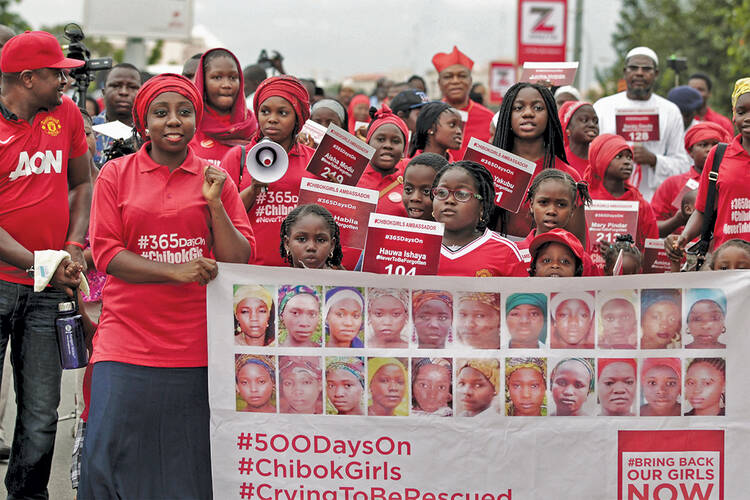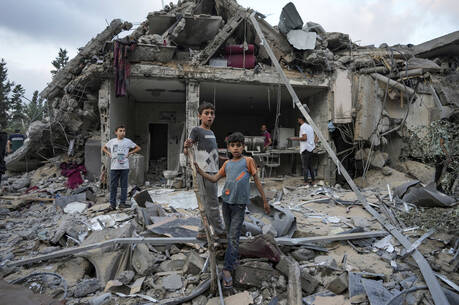The ultimate tragedy is not the oppression and cruelty by the bad people, but the silence over that by the good people.
–Martin Luther King Jr.
It has been just over two years since the abduction of close to 300 teenage schoolgirls in the town of Chibok, in northern Nigeria, by the radical Islamic group called Boko Haram. This horrible event and the nightmare associated with it continue to draw media attention and condemnation both in Nigeria and abroad in very significant ways. Some of the girls have escaped and relocated yet still struggle to cope with the trauma of their experience. In March, a girl who appeared to be about 15 years old surrendered to officials rather than carry out a mission to detonate a suicide bomb; she claimed she was one of the missing girls. Yet, even with the huge amount of international outpouring of concern and grief the world over, many of the Chibok girls, as they came to be known in the news circles and social media, are still missing, with little or no hope for their return.
How long before these girls return home, if ever, is still a question that haunts every man, woman or child who is acquainted with their ordeal and story. April, designated as NationalChild Abuse Prevention Month in the United States, was an appropriate time to remember, if with great pain and anguish, their sudden, brutal and cowardly abduction by the depraved and notorious Boko Haram terrorist group and the accompanying disappointment at the utter ineptitude of the Nigerian authorities’ failure to find them. I relate my experience with the situation of these girls as a female, born and bred in northern Nigeria. Still, I can only imagine what they have suffered and continue to suffer.
From my little experience before entering the protected walls of the Catholic convent, I remember how the female child was relegated to obscurity and oppression, with no rights or voice of her own. Hers is to be seen but not heard, useful barely as a tool for mass production of babies, and whose baby girls enter the same cycle. It is, after all, a male-dominated society, with men at the helm of most affairs, from domestic family life to the traditional, political and religious spheres.
The callous indifference of the Nigerian authorities and their lukewarm or lackadaisical attitude toward the rescue of these girls, along with the inexorable refusal to be moved by the pleas of the mothers of these suffering girls, can be said to be worse than physical child abuse; it is psychological torture of parents and their children alike! Nigerian society has long been mired in this trend of rising ethnic tensions along with economic deprivation and poorly educated young people who cannot find jobs. The result is a society now characterized by unimaginable violence, kidnapping, physical torture and deprivation of every kind.
The young schoolgirls often bear the brunt of this growing depravity in the society’s emerging culture, being used as sex slaves or objects in schools and places of employment and society at large. This is rapidly becoming an established cultural phenomenon; just witness the Hollywood characterization of the society as we know it today—one can see how art imitates culture.
But, in truth, the female child is part of our world and our society, an integral piece, some would say, a better part of creation. She was created with dignity and in the likeness of God. Indeed, she is our baby, our daughter, our granddaughter, our niece, girlfriend, fiancée, wife and the mother of our babies, both boys and girls! How can we forget that God chose a woman, Mary, to be the vessel through whom the world would be saved? How can we forget that the men, who pledged to die for Jesus, all fled, save one? But the women who had barely encountered him stayed faithful to the end. How can we further forget that it was to a woman, Mary Magdalene, that Jesus first appeared after his resurrection? How quickly we forget these facts. But a woman’s dignity is not lost for God, even if it is to many of us.
In order to restore this lost dignity, and as a mental health practitioner, I implore everyone, young, old, rich or poor alike, to break this ignominious silence and speak out strongly against child abuse and violence against women, whether it be physical or psychological. This awakening calls for a proactive sensitivity to one’s environment. In African societies like Nigeria, this also means calling out elements of child abuse, sex slavery, child labor, gender oppression or any kind of abuse against children, especially girls, be it implicit or explicit. Any form of oppression is intolerable, and merely being a spectator, whether interested or disinterested, is not an option or a solution.
Only by voicing our concerns, as those closest to the oppressive environment, and being willing to actively disengage ourselves from our own “secure” and comfort zones can we influence others to join in this crucial mission to liberate and to restore dignity to all children and women, no matter where they live on this earth. Do not forget to “Bring Back Our Girls” with your voices and slogans, but more can be achieved by our positive and proactive engagement of all our abilities and treasures. If we all do something, we will change the future of the female child for the better, one day at a time.
My dear Chibok girls, you will always be in our thoughts and prayers. You are fondly remembered with much love, honor and respect. Your physical immolation at the hands of these savage beasts takes not one iota of your dignity away. We earnestly wish that someday all of you will be freed; free in words and deeds to be the children of God you were created to be.








